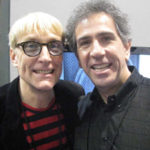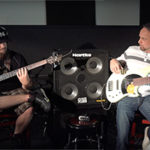Uncover the roots: A necessity for mastering the art of learning bass
By Jon Liebman
May 19, 2023
Isn’t the evolution of music fascinating?
No matter how far back you go in history, it’s always interesting to see how each new generation learns from the past on builds on what they’ve discovered.
That, of course, includes the bass. It’s mind-boggling to think of how much the electric bass has transformed since its inception, barely 70 years ago.
While today’s great bass players certainly deserve their due, it’s also important to take note of the influence their predecessors had on them.
I was talking to Frank Russell a couple weeks ago in a conversation published as this week’s FBPO interview. Frank holds a lot of respect for the pioneers of the bass and he makes a point of delivering that message to his students.
Start by going to the source
“What I tell my students,” Frank says, “is to start listening to the bass players from the ‘70s. I think that was the most fertile time. And ‘60s. You know, start out with James Jamerson and… graduate to Larry Graham, all the guys, all the way to now, to Victor Wooten…”
Frank always provides lots of encouragement to his students that want to learn what today’s bass players are doing. At the same time, though, he makes a point of instilling an appreciation for the lineage that led up to the current generation.
How today’s players evolved
“I’ve got students that love Flea,” he says. “‘Can you show me the bass line on that Stevie Wonder tune?’ And I show it to them. They want Les Claypool. I said I don’t discriminate here. Everybody’s got their voice.”
He bristles when he hears the so-called purists expressing disdain for anything they perceive to be less than legitimate, like playing jazz on an electric bass.
“Some guys get a little snobbery when they’re jazz artists and stuff,” says Frank, “but if you want to learn how to play Flea’s thing, let’s go over it.”
Listen to James Jamerson, Larry Graham and Stanley Clarke
Frank is very open to new stuff and wants his students to learn all they can from the hot players of today, as long as they keep everything in perspective.
“This is where Flea got it from,” he tells his students. “He got it from Stanley Clarke. He got it from Larry Graham.”
I find Frank’s approach very healthy, seeking to find that balance between the old and the new.
“You start with the basics,” says Frank, “with the very beginnings. And then just engross yourself into that… listening all the time, and subliminally it’ll come in.”
Learn bass from non-bassists too
Taking it a step further, Frank learned a lot about bass from non-bassists too, Stevie Wonder, for one.
Recalling an unforgettable meeting with Stevie, Frank says, “I told him what a big influence he was, his Moog bass lines from the ‘70s, with Talking Book and all those records. I said I studied that stuff just as much as I studied Larry Graham and Verdine (White) and Stanley.”
Frank was really floored at Stevie’s response: “I can hear it, brother.”
Bottom line: Learn all you can from everyone you respect. There’s no shortage of great bass players today, many with something truly valuable to offer. And if you want to go even deeper, go right to the source and study the pioneers of the bass.
Just like Flea did. Either consciously or subliminally.
How about you?
Want to learn bass? My lessons and courses in the Bottom Line Club will give you a strong foundation in bass playing, with an appreciation for the source. You’ll get lots of hands-on practice learning to groove so you can have a whole lot of fun. Find out all about joining here.





Interesting – last interview and blog were about the “dangers” of YouTube and the internet. This one suggests studying the earlier players and their stuff. And where to go to find that? Why, YouTube and the internet. Just remember Sturgeon’s Law (“ninety percent of everything is crap”) and be careful out there.
Glad you’re paying attention, Charlie! 🙂 The “dangers of YouTube” blog was about being wary of the schmoes out there who don’t have a lot of credibility and are teaching wrong, even bad, things. Learning from the genuine pioneers of good, solid bass grooving is a different story. Thanks for weighing in.